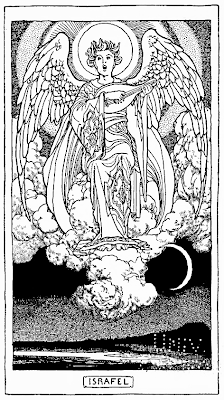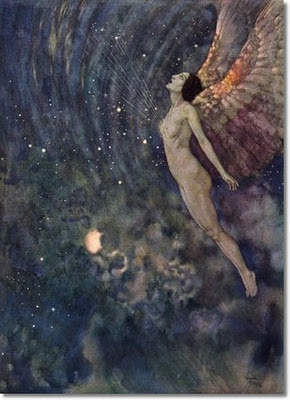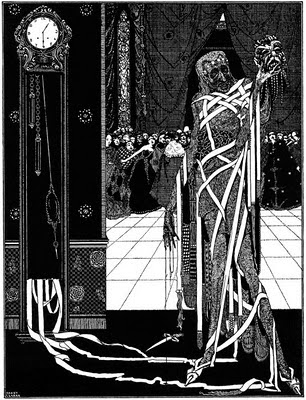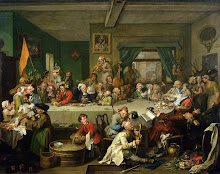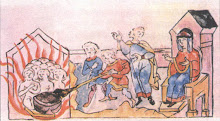
"The Raven," as you may already know, saw its probable first publication (in the New York "Evening Mirror") on this day in 1845. I decided to celebrate the noble anniversary by spotlighting two of the poem's more curious homages.
On January 11, 1848, Walt Whitman, who was at that time the editor of the "Brooklyn Eagle," published in his newspaper "A Jig in Prose," one of the innumerable parodies of "The Raven." It ran:
On January 11, 1848, Walt Whitman, who was at that time the editor of the "Brooklyn Eagle," published in his newspaper "A Jig in Prose," one of the innumerable parodies of "The Raven." It ran:
"Once upon a evening dreary,while I pondered lone and weary--o'er many an olden paper, reading forgotten stories o'er; suddenly I heard a curious, lonely, ghostly, strange, mysterious grating, underneath the floor! "'Tis some little mouse, I muttered, underneath the office floor--and nothing more. And again I trimmed the taper--and once more resumed my paper--aged, forsaken, unique paper--poring its ancient contents o'er; when again I heard repeated, this same mysterious grating, but much louder than before--and it seemed like someone sawing wood beneath the office floor; 'tis no mouse thought I, but more. As I listened, each particular hair stood upright perpendicular--cold, outstanding drops orbicular soon my forehead o'er--while a strange mysterious terror, filled my soul with fear and horror, such as I never felt before; much I wondered what this curious grating meant beneath the floor! Thus I sat and eyed the floor. And thus watching, gazing pondering, trembling, doubting, tearing, wondering, suddenly the wall was sundered, as for Banquo's ghost of yore--and while gazing much astounded, there--from there bounded a huge rat upon the floor! Not the least obeisance made he, but a moment stopped and stayed he, and nothing more. And, while gazing at each other, suddenly out came another--somewhat greyer than the other, with the weight of years he bore; then with imprecations dire, I raised my boot and higher, a step advancing nigher, whirled it safe across the floor; but the little imps had scatttered, and the door was bruised and battered, that it hit and nothing more!"
Poe scholars have speculated that these lines were composed by Whitman himself, who was known to have greatly admired Poe's work--"The Raven" in particular. (Whitman briefly met Poe in 1845, when the "Broadway Journal" published one of his essays. He later recalled that "Poe was very cordial, in a quiet way, appear'd well in person, dress, &c. I have a distinct and pleasing remembrance of his looks, voice, manner and matter; very kindly and human, but subdued, perhaps a little jaded.")
An additional clue for his possible authorship is the fact that "Jig in Prose" was published anonymously, and it was Whitman's usual practice to give credit to "Eagle" articles he did not write. If Whitman did indeed write this little jeu d'esprit--surely one of the feebler "Raven" tributes--it would not be a great surprise that he'd hesitate to reveal himself as the author. (In an ironic touch, Whitman was--for political, not, as one would assume from the above doggerel, artistic reasons--fired from the "Eagle" shortly after this poem's appearance.) One can only say that the available evidence for his authorship is sparse, but certainly plausible.
Whitman certainly had a taste for "Raven" knockoffs, however strange they may have been. Exactly one year earlier, he published in the "Eagle" another exercise in transforming Poe's celebrated bird into a turkey. Whitman described J.J. Martin's "The Dove" as "not possessing the artistic beauty of Mr. Poe's celebrated 'Raven,'" but it was, he declared, a work that "commends itself to every reader by its graceful spirit of the Christianity...its influence, as far as it goes, will be more apt to soften, and meliorate the heart."
An additional clue for his possible authorship is the fact that "Jig in Prose" was published anonymously, and it was Whitman's usual practice to give credit to "Eagle" articles he did not write. If Whitman did indeed write this little jeu d'esprit--surely one of the feebler "Raven" tributes--it would not be a great surprise that he'd hesitate to reveal himself as the author. (In an ironic touch, Whitman was--for political, not, as one would assume from the above doggerel, artistic reasons--fired from the "Eagle" shortly after this poem's appearance.) One can only say that the available evidence for his authorship is sparse, but certainly plausible.
Whitman certainly had a taste for "Raven" knockoffs, however strange they may have been. Exactly one year earlier, he published in the "Eagle" another exercise in transforming Poe's celebrated bird into a turkey. Whitman described J.J. Martin's "The Dove" as "not possessing the artistic beauty of Mr. Poe's celebrated 'Raven,'" but it was, he declared, a work that "commends itself to every reader by its graceful spirit of the Christianity...its influence, as far as it goes, will be more apt to soften, and meliorate the heart."
'Twas midnight, solemn, dark and deep,
And vainly I had courted sleep,
When, worn with pain, and anguish-tossed,
Hope, faith, and patience nearly lost,
I heard a sound, a gentle sound.
Breaking the solemn stillness round.
A gentle, soft and murmuring sound,
Making the stillness more profound.
I hushed my breath--again it came--
My heart beat faster--still the same
Low, gentle murmur met mine ear,
Approaching nearer and more near,
A single sound, yet soft and clear,
And strongly fraught with memories dear,
A flood of clear and single light,
Then burst upon my raptured sight,
Filling my little chamber quite.
And in that light a bird was seen,
Not "grim and black" with stately mien,
But purely white and beautiful,
With look so mild and dutiful,
A lovely bird, with plumage white,
In that calm, still and clear moonlight.
This winged visitor answers every piteous wail of the narrator not with an ominous "Nevermore," but with a cheery "God is love!" After four more verses which I simply do not have the fortitude to transcribe, the poem concludes:
"Thanks heavenly messenger," I cried,
"Remain that picture still beside,
Surrounded by the light of truth,
Companion meet for sinless youth,
Thou blessed type of Love and Peace,
My hope and faith thou'lt still increase;
Be ever near me, gentle dove,
I know I feel that--"God is love!"
By that Heaven that bends above us--by that God we both adore--If poetry like that isn't sacrilege, I don't know what is.
Well, never mind. As I suggested last year on this date, do give yourself some respite and nepenthe by reading the real thing.
